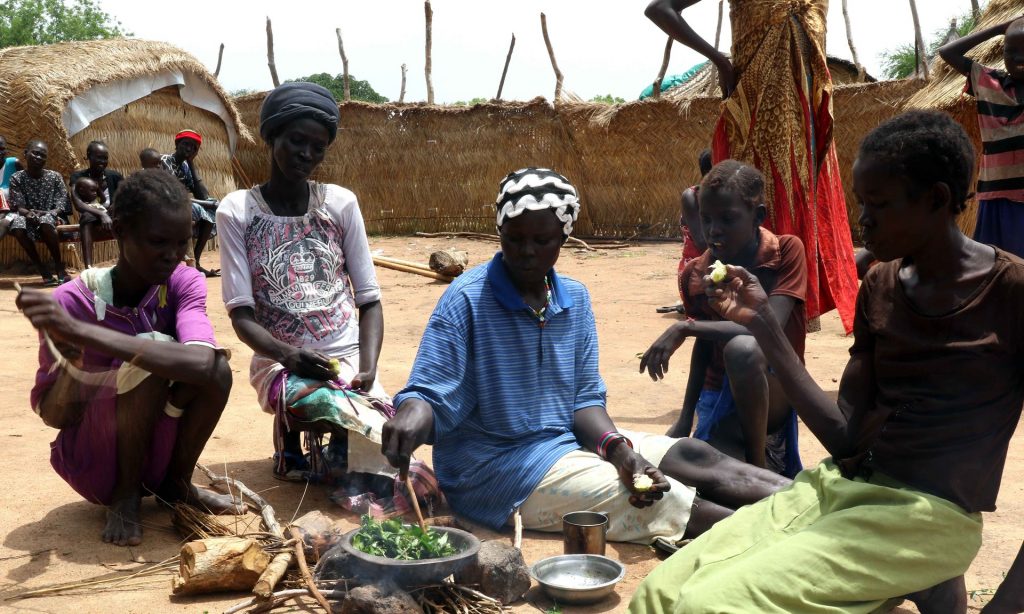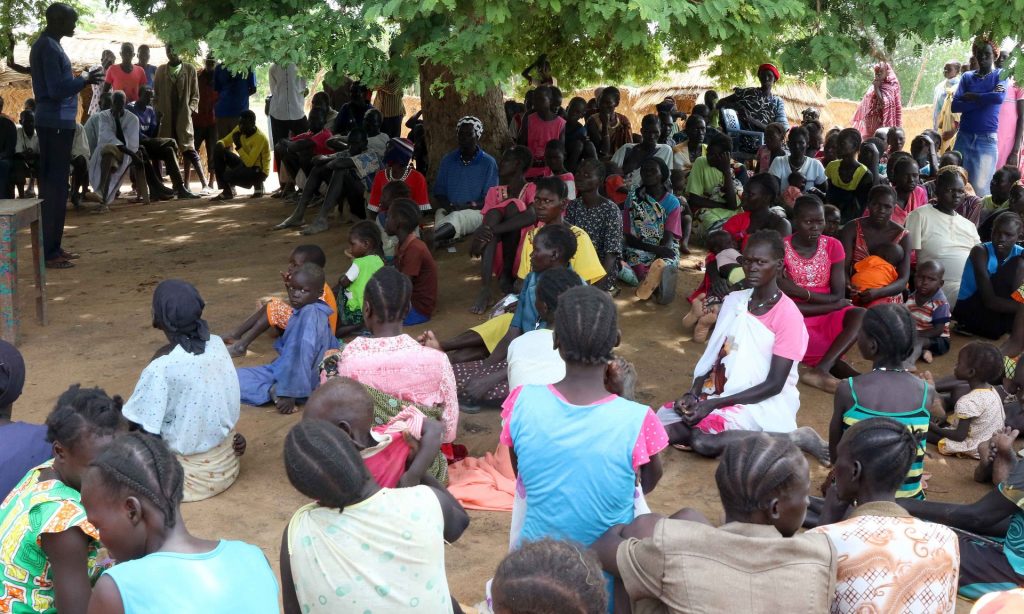
Photograph: Simona Foltyn
To survive, there is no other option but to cross the river back to Sudan, says Ajak Adong, a mother of six, as she cooks a lunch of leaves. It’s all the family has been eating since arriving in the border town of Kiir Adem two months ago.
For decades, South Sudanese fought to secede from Sudan, home to a government they accused of marginalising them. Now, five years after the world’s youngest nation attained independence, hunger is driving tens of thousands back.
“There is no work, nothing to eat here and no money,” says Adong, one of more than 3,500 people stranded near the border in South Sudan’s Northern Bahr el Ghazal state.
The region was heavily contested during the second civil war with Sudan, which began in 1983. The war ended with a 2005 peace deal signed between the Khartoum government and the SPLM, the South Sudan Liberation Movement turned ruling party, paving the way for South Sudan’s independence in 2011.
Yet the nation’s short existence has been plagued by yet another conflict, this time fought between rival factions of the SPLM. Despite a peace deal signed in August, heavy fighting between government and opposition forces continues, with hundreds killed in the capital, Juba, last weekend.
The protracted violence has created one of the world’s worst humanitarian crises. More than 4.8 million people – almost half of the population – face “unprecedented levels of food insecurity”, according to a UN survey last month.
Hunger was once confined to conflict-ridden areas, but, owing to poor rains and pests, food insecurity has now spread to other, relatively peaceful, regions. In Northern Bahr el Ghazal, last year’s harvest failures have left 84% of the population food insecure, with many relying on leaves and palm fruits. The crisis has been made worse by a floundering economy and skyrocketing food prices.
More than 100,000 people have left South Sudan for Sudan due to hunger, according to South Sudanese government estimates, while another 6,000 are stranded in border towns such as Kiir Adem, waiting for an opportunity to cross.
Yet getting across the roughly 2,000km-long border that separates the two countries is not that simple.
To start with, it’s unclear where exactly the border is. Even though Sudan and South Sudan separated five years ago, the border has yet to be demarcated. Kiir Adem lies in a contested area known as Mile 14, claimed by both Khartoum and Juba. A river – called Kiir by South Sudan and Bahr el Arab by Sudan, marks the de-facto boundary, although the Sudanese government insists the border should run 23km further south, along the 1956 colonial borders upheld by the 2005 peace deal.
On paper, the two governments have committed to free movement of goods and people. But except for a brief opening this year, the border has remained sealed amid mutual accusations of harbouring rebel groups.
The simmering political tensions between Khartoum and Juba have complicated matters for South Sudanese people. To travel to Sudan, they require either approval by South Sudan’s national security services, granted only in rare circumstances, or money to bribe border officials on both sides.
Most people uprooted by hunger don’t have either, and so they are left with two unappealing options: stay at the border and hope for food aid, or sneak across without papers; a risky undertaking that involves days of trekking through the bush and on muddy roads made impassable by seasonal rains.
Faced with this difficult choice, many families have been torn apart trying to hedge their bets, with the weakest staying behind while the strongest try their luck across the border. Adong’s three older sons, aged between 16 and 22, crossed the border illegally in the hope of finding work in Sudan, while she stayed in Kiir Adem with the younger children.
That was weeks ago, yet Adong still hasn’t received any news. She is worried her sons might have run into trouble with the authorities. When South Sudan descended into civil conflict in December 2013, young men reportedly crossed the border at Kiir Adem to join defected generals who based themselves in Sudan’s southern Darfur region. Since the August peace deal, ceasefire violations are frequent, and anyone sneaking across the border could be suspected of joining rebels.

Photograph: Simona Foltyn
Yet it’s not just fear of insurgents making the authorities unhappy. Now that South Sudanese finally have their own country, the government “feels shame” that many are opting to go back to Sudan so soon after independence, one local government official who wanted to remain anonymous told the Guardian.
In Kiir Adem, South Sudanese government officials pleaded with dozens of families who had gathered near the office of the district administrator to stay, promising that relief was on the way. “We don’t want them to go. We are trying our level best to get help,” said Nyanut Kiir, the area coordinator from the government’s Relief and Rehabilitation Commission.
By the end of June, the UN’s World Food Programme had completed registrations for a food distribution, while a medical charity had started supplemental feeding for malnourished children. More help was needed, but the contested nature of the border has made it difficult for agencies to work in the area.
As the day in Kiir Adem drew to a close, new arrivals started to trickle into the town. Carrying a few basic belongings, they had walked for days along the deserted gravel road leading north, frequented only by nomadic cattle herders and military trucks. The bridge across the river Kiir to Sudan was just a couple of kilometres away but, for now, all they could do was wait and hope that aid would arrive soon.

